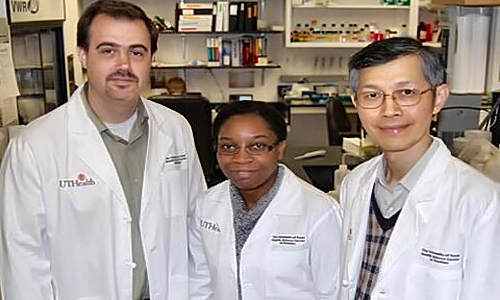Much like using dimmer switches to brighten or darken rooms, biochemists have identified a protein that can be used to slow down or speed up the growth of brain tumors in mice.
UTHealth scientists working on fundamental molecular mechanisms tied to brain tumor growth are from left to right Eric J.Wagner, Ph.D., Chioniso P. Masamha, Ph.D., and Ann-Bin Shyu, Ph.D.
Brain and other nervous system cancers are expected to claim 14,320 lives in the United States this year.
The results of the preclinical study led by Eric J. Wagner, Ph.D., and Ann-Bin Shyu, Ph.D., of The University of Texas Health Science Center at Houston (UTHealth) and Wei Li, Ph.D., of Baylor College of Medicine appear in the Advance Online Publication of the journal Nature.
“Our work could lead to the development of a novel therapeutic target that might slow down tumor progression,” said Wagner, assistant professor in the Department of Biochemistry and Molecular Biology at the UTHealth Medical School.
Shyu, professor and holder of the Jesse H. Jones Chair in Molecular Biology at the UTHealth Medical School, added, “This link to brain tumors wasn’t previously known.”
“Its role in brain tumor progression was first found through big data computational analysis, then followed by animal-based testing. This is an unusual model for biomedical research, but is certainly more powerful, and may lead to the discovery of more drug targets,” said Li, an associate professor in the Dan L. Duncan Cancer Center and Department of Molecular and Cellular Biology at Baylor.
Wagner, Shyu, Li and their colleagues discovered a way to slow tumor growth in a mouse model of brain cancer by altering the process by which genes are converted into proteins.
Appropriately called messenger RNA for short, these molecules take the information inside genes and use it to make body tissues. While it was known that the messenger RNA molecules associated with the cancerous cells were shorter than those with healthy cells, the mechanism by which this occurred was not understood.
The research team discovered that a protein called CFIm25 is critical to keeping messenger RNA long in healthy cells and that its reduction promotes tumor growth. The key research finding in this study was that restoring CFIm25 levels in brain tumors dramatically reduced their growth.
“Understanding how messenger RNA length is regulated will allow researchers to begin to develop new strategies aimed at interfering with the process that causes unusual messenger RNA shortening during the formation of tumors,” Wagner said.
Additional preclinical tests are needed before the strategy can be evaluated in humans.
“The work described in the Nature paper by Drs. Wagner and Shyu stems from a high-risk/high-impact Cancer Prevention & Research Institute of Texas (CPRIT) proposal they submitted together and received several years ago,” said Rod Kellems, Ph.D., professor and chairman of the Department of Biochemistry and Molecular Biology at the UTHealth Medical School.
“Their research is of fundamental biological importance in that it seeks to understand the role of messenger RNA length regulation in gene expression,” Kellems said. “Using a sophisticated combination of biochemistry, genetics and bioinformatics, their research uncovered an important role for a specific protein that is linked to glioblastoma tumor suppression.”
Other UTHealth contributors include postdoctoral fellow Chioniso P. Masamha, Ph.D.; research associate Todd R. Albrecht; and neurosurgery associate professor Min Li, Ph.D., along with a postdoctoral fellow in his lab, Jingxuan Yang, Ph.D.
“Grade IV astrocytomas (GBM) are the most frequent and malignant form of brain tumor, with a median survival time of only 14.6 months. The mechanisms underlying gliomagenesis remain largely unknown, and limited choices are available for patients with GBM,” said Min Li, director of the Cancer Research Program in the Vivian L. Smith Department of Neurosurgery at UTHealth and a member of the Mischer Neuroscience Institute at Memorial Hermann-Texas Medical Center.
Wagner, Shyu and Min Li are on the faculty of The University of Texas Graduate School of Biomedical Sciences at Houston. Zheng Xia, Ph.D., a postdoctoral in the laboratory of Wei Li, also contributed to the study.
Story Source:
The above story is based on materials provided by The University of Texas Health Science Center at Houston.





